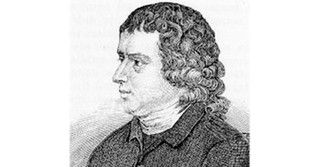3 Truths from the Hymn "Come Thou Fount" to Renew Your Wonder
Share

“Come, Thou Fount of every blessing, Tune my heart to sing Thy grace;”...
Have you ever wondered what prompted the writing of this beloved hymn? Ever since childhood, I have been captured by these words and the raw disclosure of the writer's heartfelt prayer to be ever-tethered to the Lord. Each stanza of this popular song conveys both praise and deep prayer in being captured by God’s goodness and grace despite the heart’s proneness to wander. The story told within this well-known hymn holds many beautiful truths for us still today.
Photo credit: ©Getty Images/Creativa Images
From a Stranger to a Son

Born in England in 1735, future hymnist Robert Robinson’s childhood was marked by tragedy, losing his father at the young age of eight. Shortly after his father's passing, Robinson’s mother sent him to London to pursue trade school for barbering. It was during this time, Robinson lived what would be considered a reckless lifestyle. According to biographical sources, Robinson’s life before faith was one marked by struggle and sin. Yet as his hymn would later depict, while such a stranger, Robinson was rescued from his path of danger.
In an attempt to “scoff at the poor, deluded Methodists” Robinson and his friends attended one of George Whitefield's revival meetings. Whitefield’s message caught young Robinson’s attention and it was there he professed his faith in Christ. A few years after his conversion, Robinson left his trade career to pursue ministry in the Methodist church. Over several years, Robinson moved to Cambridge, leaving the Methodist church and becoming a Baptist preacher, known theologian, and hymnist.
Photo credit: Wikimedia Commons/Public Domain Image/Edwin McKean Long
Falling Away

In 1758, “Come Thou Fount of Every Blessing” was penned by the young Reverend Robinson, which so eloquently depicts his personal encounter with God’s grace and his desire to pursue God’s goodness despite the internal struggle of wandering from God’s love. These final words of Robinson’s hymn somewhat foreshadowed his later years, as many accounts of his life report that the once passion-filled minister lost his sense of wonder and did actually wander from the God he loved. It is said that his theological views gradually shifted to the extent of denying the deity of Christ.
In one later account of his life, it is said that a female passenger on a stage-coach journey began humming the tune of “Come Thou Fount” and inquired to what he thought. He responded with tearful regret, saying “Madam, I am the unhappy man who wrote that hymn many years ago, and I would give a thousand worlds if I had them if I could feel as I felt then.”
When first reading this unexpected ending to Robinson’s story, I was disheartened but the frailty of Robinson’s faith, which once found such strength in the sovereignty of God’s truths. Yet, in many ways, this story grants even more insight and implications into the foundation of our faith. Much like Robinson, we too are just as apt to wander away from the goodness of God if we lose the wonder found in our worship and neglect to daily place our faith in the hope that once so overwhelmed our souls to sing of His grace.
Photo credit: ©Getty Images/Katarzyna Bialasiewicz
3 Truths Found in the Lyrics

In my reflection of Robinson’s life and lyrics, I have found 3 important truths found in God’s character that I hope will refresh and strengthen our souls to keep on singing. For I believe it is in our wonder of God that we fortify our faith to withstand the wandering of our human hearts.
1. The Wonder of God’s Goodness
“Come, Thou Fount of every blessing,
Tune my heart to sing Thy grace;
Streams of mercy, never ceasing,
Call for songs of loudest praise.
Teach me some melodious sonnet,
Sung by flaming tongues above;
Praise the mount! I’m fixed upon it,
Mount of Thy redeeming love.”
Robinson opened his heart-filled prayer, likening God to the “fount” for which all blessings come (Ephesians 1:3-10). A.W. Tozer expounds on the gift of God’s goodness in The Knowledge of The Holy saying, “The goodness of God is the drive behind all the blessings He daily bestows on us. God created us because he felt good in his heart and he redeemed us for the same reason.”
It is in the light of God’s goodness, that Robinson petitioned for the tuning of his heart to sing of God’s grace, the Holy Spirit’s interposed salvation song. This first stanza beautifully echoes Psalm 100, in which David highlight’s God’s goodness as the motivation of our worship, saying:
“Make a joyful noise to the Lord, all the earth.
Serve the Lord with gladness!
Come into his presence with singing!
Know that the Lord, he is God!
It is he who made us, and we are his;
We are his people and the sheep of his pasture.
Enter his gates with thanksgiving,
and his courts with praise!
Give thanks to him; bless his name!
For the Lord is good;
his steadfast love endures forever,
and his faithfulness to all generations.”
It is in daily placing our attention on God’s good character which prompts our hearts to learn the art of loudest praise. For both David’s psalm and Robinson’s lyrics remind us of God’s ultimate lordship yet gentle goodness. Tozer put it this way, “The greatness of God rouses fear within us, but His Goodness encourages us to not be afraid of Him. To fear and not be afraid - that is the paradox of faith.”
Photo credit: Unsplash/Kyler Nixon
2. The Wonder of God's Guidance

In the second stanza of “Come Thou Fount,” Robinson uses language that is somewhat unfamiliar to many of us today, writing:
“Here I raise my Ebenezer:
Here by Thy great help I’ve come;
And I hope, by Thy good pleasure,
Safely to arrive at home
Jesus sought me when a stranger,
Wand’ring from the fold of God;
He, to rescue me from danger,
Interposed His precious blood.”
Surprisingly, the term “Ebenezer” is an Old Testament reference from 1 Samuel 7:12. Within this Biblical narrative, Samuel erected a stone, naming it Ebenezer, a stone of help, as a dedication to God’s divine assistance in defeating the Philistines saying, “Till now the Lord has helped us.”
Within these symbolic lyrics, Robinson encourages the reflection of God’s guidance, which empowers the believer’s spiritual walk of sanctification. Robinson also reflects on his personal journey of God’s divine guidance which saved him from his worldly wandering and rescued him from his wayward lifestyle through Christ’s payment for salvation. For God’s first act of loving-guidance on behalf of His children is seen in His sacrifice of His only Son.
1 John 4:9-10 reminds us of this fatherly affection saying, “In this, the love of God was made manifest among us, that God sent his only Son into the world so that we might live through him. In this is love, not that we have loved God but that he loved us and sent his Son to be the propitiation for our sins.”
In addition to Christ's work on the cross, God’s persistent guidance is seen through the outpouring of the Holy Spirit. Such spiritual reliance is often devalued in our culture, one which promotes self-starting, self-directed individualism. Yet, as we face daily face the disappointments and difficulties of our fallen world, we can be comforted by Jesus’ words in John 14:16, 26-27:
“And I will ask the Father, and he will give you another Helper, to be with you forever ... But the Helper, the Holy Spirit, whom the Father will send in my name, he will teach you all things and bring to your remembrance all that I have said to you. Peace I leave with you; my peace I give to you. Not as the world gives do I give to you. Let not your hearts be troubled, neither let them be afraid.”
With this hope and the help of the Holy Spirit, our advocate (John 16:7), we are enabled to withstand the whys and what-ifs of life and one day safely arrive at heaven’s gates reunited with our King.
Photo credit: Unsplash/Stephan Henning
3. The Wonder of God's Grace

The final stanza of Robinson’s autobiographical hymn focuses on God’s unmerited grace. Robinson speaks of his desire to yield to God’s lordship despite his human tendency to wander.
“Oh, to grace how great a debtor
Daily I'm constrained to be
Let that goodness like a fetter
Bind my wandering heart to Thee
Prone to wander, Lord, I feel it
Prone to leave the God I love
Here's my heart, Lord, take and seal it
Seal it for Thy courts above.”
His final words of this hymn are some of the most well-known verses due to their reliability and honesty, describing the internal battle of the human heart. For this grace, which Robinson felt indebted to daily, is the most powerful force the Father has bestowed on his children through Christ. For this undeserved favor is what invites us to lay down our shame, our struggles, our sin, and take hold of God’s divine power to overcomes strongholds.
2 Corinthians 12:9 reminds us of the sufficiency of God’s grace to cover our weakness, for which the Apostle Paul was able to boldly reply, “Therefore, I will boast all the more gladly of my weaknesses, so that the power of Christ may rest upon me.”
Oh, how the wonder of God’s immeasurable grace is so quickly misplaced in our world today, as we so frequently seek to save ourselves with service rather than surrender, requirements rather than reverence, duty rather than delight.
Have we forgotten that it is by grace we have been saved through faith? And nothing of our own doing but simply a gift of God, not a result of work, so that we cannot boast in ourselves (Ephesians 2:8 paraphrased).
This is where Robinson's words so often echo our own: “Prone to wander, Lord I feel it, Prone to leave the God I love.”
This intersection of God’s grace and man’s will is referenced by the prophet Isaiah saying, “We all like sheep have gone astray, each one has turned to his own way, and the LORD has laid on Him the iniquity of us all” (Isaiah 53:6).
Despite man’s tendency to wander, 1 Peter 2:24-25 reflects on the fulfillment of Isaiah’s prophecy saying, “He [Christ] himself bore our sins in his body on the tree, that we might die to sin and live to righteousness. By his wounds, you have been healed. For you were straying like sheep, but have now returned to the Shepherd and Overseer of your souls.”
This is what grace does, it invites us back into the fold of the Good Shepherd and bids us taste and see that the Lord is truly good (Psalm 34:8).
My hope is that these beautiful truths, written hundreds of years ago, will continue to bring hope to our weary souls on days where we too feel our hearts wandering from the wonder of God’s goodness and grace. For the final words of this hymn will be forever my prayer:
“Here's my heart, Lord, take and seal it, Seal it for your courts above.”
References:
Butterworth, H., Brown, T. (1906) The Story of the Hymns and Tunes. George Doran Company. New York. p.283-284.
Hawn M. C. (2013) History of Hymns: Come, thou Fount of every blessing. Discipleship ministries.
Hindmarsh, B., (2019). Was He Too Prone to Wander? Desiring God.
Tozer, A.W. (1961) The Knowledge of the Holy. HarperCollins Publishers. New York. p. 81-82.
Photo credit: ©Getty Images/ipopba
Carley Marcouillier: A northerner by heart southerner by choice, Carley currently calls Virginia her home. After completing her Master’s degree in clinical mental health counseling, Carley began to develop a passion for integrating the principles of counseling practice with the foundation of Christian theology. In addition to her clinical work, Carley is passionate about discussing topics of faith, theology, psychology, and everything in between on her social media platforms www.carleymarcouillier.com, Instagram, and Facebook
FREE PODCAST RESOURCE: Are you looking for resources to better understand yourself and grow spiritually? You've come to the right place. Join licensed therapist Carley Marcouillier on the Therapy + Theology Podcast each week as she tackles a common question related to therapy, mental health, and faith. Listen to an episode now by clicking the play button below: